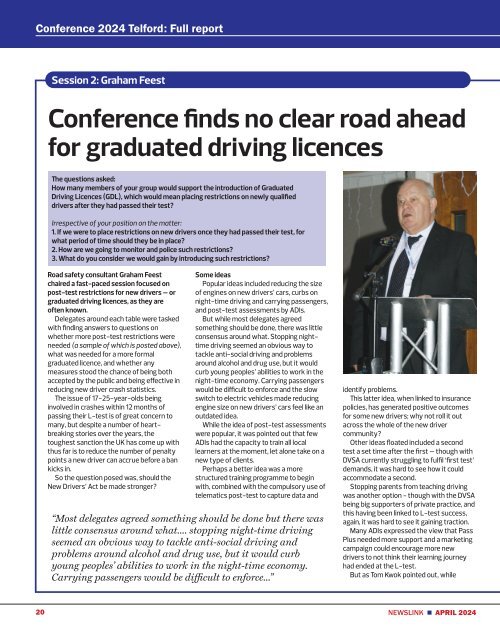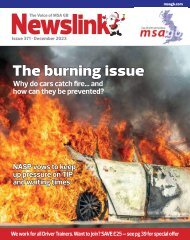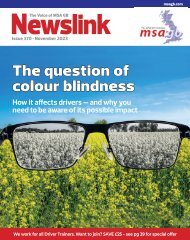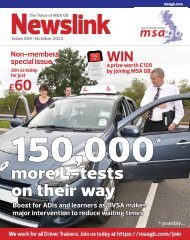Newslink April marketing special
Motor Schools Association of Great Britain - driving instructors - marketing and new members special. Road safety, driver training and testing
Motor Schools Association of Great Britain - driving instructors - marketing and new members special. Road safety, driver training and testing
You also want an ePaper? Increase the reach of your titles
YUMPU automatically turns print PDFs into web optimized ePapers that Google loves.
Conference 2024 Telford: Full report<br />
Session 2: Graham Feest<br />
Conference finds no clear road ahead<br />
for graduated driving licences<br />
The questions asked:<br />
How many members of your group would support the introduction of Graduated<br />
Driving Licences (GDL), which would mean placing restrictions on newly qualified<br />
drivers after they had passed their test?<br />
Irrespective of your position on the matter:<br />
1. If we were to place restrictions on new drivers once they had passed their test, for<br />
what period of time should they be in place?<br />
2. How are we going to monitor and police such restrictions?<br />
3. What do you consider we would gain by introducing such restrictions?<br />
Road safety consultant Graham Feest<br />
chaired a fast-paced session focused on<br />
post-test restrictions for new drivers – or<br />
graduated driving licences, as they are<br />
often known.<br />
Delegates around each table were tasked<br />
with finding answers to questions on<br />
whether more post-test restrictions were<br />
needed (a sample of which is posted above),<br />
what was needed for a more formal<br />
graduated licence, and whether any<br />
measures stood the chance of being both<br />
accepted by the public and being effective in<br />
reducing new driver crash statistics.<br />
The issue of 17-25-year-olds being<br />
involved in crashes within 12 months of<br />
passing their L-test is of great concern to<br />
many, but despite a number of heartbreaking<br />
stories over the years, the<br />
toughest sanction the UK has come up with<br />
thus far is to reduce the number of penalty<br />
points a new driver can accrue before a ban<br />
kicks in.<br />
So the question posed was, should the<br />
New Drivers’ Act be made stronger?<br />
Some ideas<br />
Popular ideas included reducing the size<br />
of engines on new drivers’ cars, curbs on<br />
night-time driving and carrying passengers,<br />
and post-test assessments by ADIs.<br />
But while most delegates agreed<br />
something should be done, there was little<br />
consensus around what. Stopping nighttime<br />
driving seemed an obvious way to<br />
tackle anti-social driving and problems<br />
around alcohol and drug use, but it would<br />
curb young peoples’ abilities to work in the<br />
night-time economy. Carrying passengers<br />
would be difficult to enforce and the slow<br />
switch to electric vehicles made reducing<br />
engine size on new drivers’ cars feel like an<br />
outdated idea.<br />
While the idea of post-test assessments<br />
were popular, it was pointed out that few<br />
ADIs had the capacity to train all local<br />
learners at the moment, let alone take on a<br />
new type of clients.<br />
Perhaps a better idea was a more<br />
structured training programme to begin<br />
with, combined with the compulsory use of<br />
telematics post-test to capture data and<br />
“Most delegates agreed something should be done but there was<br />
little consensus around what.... stopping night-time driving<br />
seemed an obvious way to tackle anti-social driving and<br />
problems around alcohol and drug use, but it would curb<br />
young peoples’ abilities to work in the night-time economy.<br />
Carrying passengers would be difficult to enforce...”<br />
identify problems.<br />
This latter idea, when linked to insurance<br />
policies, has generated positive outcomes<br />
for some new drivers; why not roll it out<br />
across the whole of the new driver<br />
community?<br />
Other ideas floated included a second<br />
test a set time after the first – though with<br />
DVSA currently struggling to fulfil ‘first test’<br />
demands, it was hard to see how it could<br />
accommodate a second.<br />
Stopping parents from teaching driving<br />
was another option - though with the DVSA<br />
being big supporters of private practice, and<br />
this having been linked to L-test success,<br />
again, it was hard to see it gaining traction.<br />
Many ADIs expressed the view that Pass<br />
Plus needed more support and a <strong>marketing</strong><br />
campaign could encourage more new<br />
drivers to not think their learning journey<br />
had ended at the L-test.<br />
But as Tom Kwok pointed out, while<br />
20 NEWSLINK n APRIL 2024
















